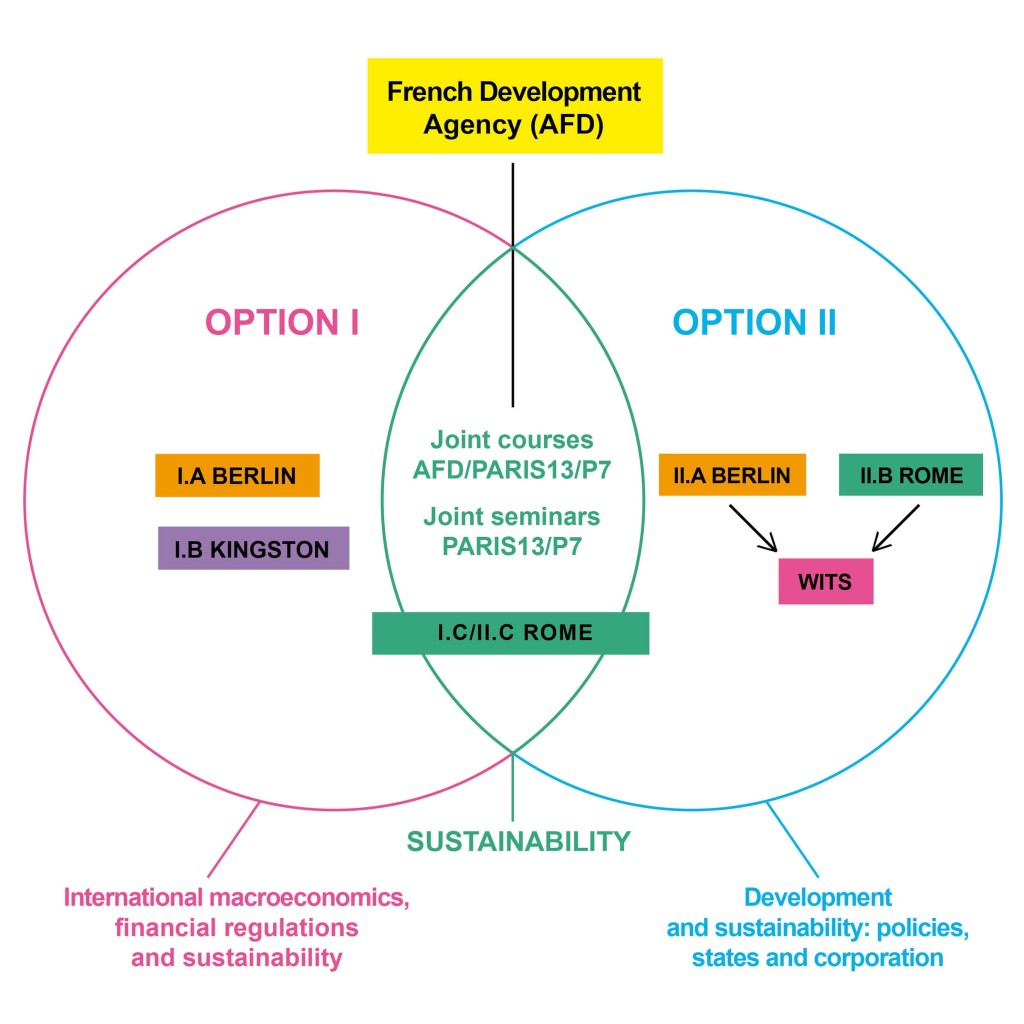Based on the specific and internationally recognized skills embedded in each of the consortium partners offering courses for EPOG (BSEL in Berlin, Kingston, Roma 3, Wits in Johannesburg, Université de Paris and Université Sorbonne Paris Nord), plus the course offered by staff members of the French development agency (Agence française de développement, AFD), this particular Master’s programme trains its students in environmental economics, macroeconomics, development economics, innovation, finance, and interdisciplinary approaches including amongst others environmental science, law, political sciences, geography, history or sociology. These specializations are grouped around two alternative options :
- Option I: International Macroeconomics, Financial Regulations, and Sustainability Focuses on the global context of macroeconomic modelling and economic policy-making in open economies, the underlying structural causes of growing income inequality and financial instability shaping the growth pattern of these increasingly interdependent economies, and how these economies might use innovation and governance changes to incorporate sustainable development objectives for their long-term survival. The central role of finance and its effective regulation are the thread tying these three concerns together.
| Option I – International Macroeconomics, Financial Regulations and Sustainability | |
| Option I. A International economics and governance | BSEL during the first year, then Université Sorbonne Paris Nord |
| Option I. B Political economy and finance | Kingston U. during the first year, then Université Sorbonne Paris Nord |
| Option I. C Structural change, inequality and employment | Roma Tre during the first year, then Université Sorbonne Paris Nord |
See the detailed curriculum of Option I here.
- Option II: Development and Sustainability: Policies, States and Corporations
integrates microeconomic aspects, on the level of corporations and other key actors, with sectoral approaches analysing key industries to examine more closely how governments can successfully promote innovation and environmental policy considerations in promotion of sustainable development goals, with the transition to a low-carbon economy in the face of potentially devastating climate change a central theme in this option. Two alternative majors promote the merging of sustainable and economic development so as to expose students so motivated to a wider range of development policies.
| Option II – Development and Sustainability: Policies, States and Corporations | |
| Option II. A Development, Macroeconomics and Finance | BSEL during Semester 1, Wits during Semester 2, then Université de Paris and Université Sorbonne Paris Nord |
| Option II. B Political economy and International Development | Roma Tre during Semester 1, Wits during Semester 2, then Université de Paris and Université Sorbonne Paris Nord |
| Option II. C Structural change, inequality and employment | Roma Tre during the first year, then Université de Paris and Université Sorbonne Paris Nord |
See the detailed curriculum of Option II here.
Please note that finally the Option II will open to applications for the academic year
2020-2022.
The choice of option, each comprising specific majors, determines the partner institution(s) where the students will spend their first year of the Master’s course (Semesters 1 and 2). All EPOG students will spend their third semester in Paris. This will allow them to deepen their expertise in their chosen option while also developing a better integrated and more coherent understanding of various economic policies and their interdependencies. That commonly shared experience will also provide the entire cohort ample opportunity to work together and acquire a common culture.
For Semester 4, depending on their Master’s dissertation project, the option they have chosen and their career perspectives, students can: (i) stay on at the Universities of Université de Paris and Université Sorbonne Paris Nord, (ii) return to the university where they spent the first year of the Master. Alternatively, in order to increase their employability, they also have the option of completing a professional internship (linking the theory with practice and gaining professional experience in a non-academic job) or working in a research lab. Note that the thesis will count for 18 ECTS.
Students spending their first year at the University of Roma Tre have the choice of either option. Even though the two groups in Rome have exactly the same large and somewhat eclectic selection of courses combining a macro context with innovation and sustainability during the first year, those opting for Option II.C rather than I.C will have different courses during their third semester in Paris more closely matching those of Roma Tre as opposed to the second-year focus on macroeconomics and finance offered to those in Option I.C. In addition, the special-focus choices available for students in all three variants of Option II focus on specific strategic sectors and innovation policy

